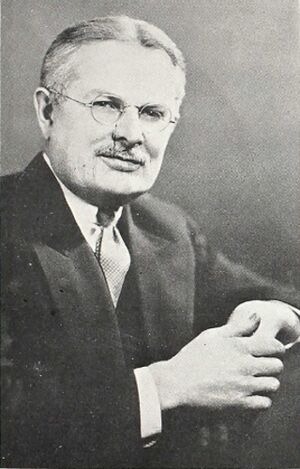Quincy Wright facts for kids
Quick facts for kids
Quincy Wright
|
|
|---|---|

Quincy Wright, circa 1940
|
|
| Born | December 28, 1890 Medford, Massachusetts, United States |
| Died | October 17, 1970 (aged 79) Charlottesville, Virginia, United States |
| Occupation | professor, Political scientist |
| Genre | War, International law |
Philip Quincy Wright (born December 28, 1890 – died October 17, 1970) was an American expert in how countries get along (called international relations) and the rules they follow (called international law). He was a professor at the University of Chicago. He was famous for his big project called the 'Causes of War' study. This project led to a very important book, A Study of War, published in 1942.
Contents
Early Life and Education
Quincy Wright was born in Medford, Massachusetts. He earned his first college degree from Lombard College in 1912. Later, he completed his Ph.D. (a high-level university degree) at the University of Illinois in 1915. He also received another special law degree.
Teaching and Research Career
Wright taught at Harvard University and the University of Minnesota. In 1923, he joined the University of Chicago. There, he helped start the first university program in the United States focused on international relations in 1928.
Wright also advised Justice Robert H. Jackson during the Nuremberg Trials. These trials were held after World War II to judge important war criminals. He often gave advice to the United States Department of State, which handles America's relationships with other countries.
In 1956, he became a professor at the University of Virginia. He retired in 1961 but continued to teach as a visiting professor. He taught at many universities around the world, including in China, Switzerland, Mexico, and Turkey.
Leadership Roles
Throughout his career, Wright led several important academic groups. He was president of the American Political Science Association and the American Society of International Law. He was also a member of the American Philosophical Society.
His father was an economist named Philip Green Wright. His brothers were the famous geneticist Sewall Wright and the aeronautical engineer Theodore Paul Wright.
Studying Why Wars Happen
After World War I, many thinkers wanted to understand why wars started. When Wright came to the University of Chicago, he started a big study on wars. This project involved many different experts and led to over 40 research papers and 10 books. Wright put all this research together in his most important book, A Study of War, published in 1942.
Impact of A Study of War
A famous professor named Karl Deutsch said that to stop wars, we must understand them. He praised Quincy Wright for working hard and carefully to study war. Wright's book gathered many facts and ideas about war.
Wright's work inspired many other experts who study societies. His collection of information about wars is still very helpful today for people studying conflicts.
Other Important Books
Besides A Study of War, Wright wrote 20 other books and almost 400 articles for academic journals. Some of his books became standard textbooks. These include Mandates Under the League of Nations (1930) and The Study of International Relations (1955).
In The Study of International Relations, Wright explained that international relations involves many different subjects. These include international law, history of diplomacy, military science, and international trade.
Views on Colonialism
Wright was an expert on the "mandates system." This was a way for certain countries to govern territories after World War I. While researching for his book Mandates Under the League of Nations, Wright visited Damascus. He saw the damage from a conflict there.
His experiences made him think deeply about colonialism. He believed that the people of Syria were capable of governing themselves. He argued that the actions taken against them were wrong.
Selected Publications
- The Control of American Foreign Relations. 1922. Macmillan.
- Mandates Under the League of Nations. 1930. University of Chicago Press.
- Public Opinion and World Politics. 1933. University of Chicago Press.
- A Study of War. 1942. University of Chicago Press.
- The Study of International Relations. 1955. Appleton-Century-Crofts.
- The Strengthening of International Law. 1960. Academic of International Law.
- International Law and the United States. 1960. Asia Publishing House.
- The Role of International Law in the Elimination of War. 1961. Oceana.
See also
- War cycles
Images for kids
 | Sharif Bey |
 | Hale Woodruff |
 | Richmond Barthé |
 | Purvis Young |


